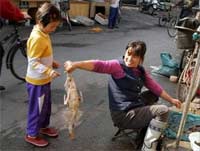Despite countries raising alarms about avian influenza and each having its own policies to combat the virus, the disease continues to spread westward, most recently causing an outbreak among a flock of ducks in Sweden, on the western edge of Europe.
 |
|
A duck vendor in Beijing hands a freshly slaughtered duck to his daughter. |
The Swedish laboratory discovered the influenza virus over the weekend in a dead duck from the flock and is conducting further tests to determine the type of virus. Simultaneously, the UK received a parrot infected with the H5 virus at the border, which died immediately in quarantine.
This parrot was imported from Suriname (South America) and had been kept together with a shipment of birds from Taiwan. In Croatia, authorities reported the deaths of six swans at a lake and indicated that tests are underway to identify the disease.
The Croatian Ministry of Agriculture stated that all poultry within a 3km radius must be culled to prevent the spread of avian influenza. Russia has recorded a new outbreak in Tula, located 300km south of Moscow.
Veterinary facilities in Russia expressed concerns that the avian influenza virus has spread to 24 regions (20 in Novosibirsk, three in Kurgan, and one in Stavropol). Meanwhile, Romania recently announced it had contained H5N1 in two southeastern locations but shortly afterward reported a new suspected infection in the northeast.
With the avian influenza threat intensifying across Europe, countries have yet to unify their preventive measures. The UK has sent a memorandum to the European Union proposing a ban on the import of all wild birds from any country worldwide.
Austria, Switzerland, and Germany are mandating farmers to confine all poultry; Germany has even implemented a fine of up to $30,000 for violations. However, France firmly opposes the confinement measure due to concerns about causing neurological issues in the birds.
In Asia, Thailand has introduced two new decrees to tighten its avian influenza control measures, including prohibiting farmers from keeping poultry within a 10km radius of any confirmed outbreak and requiring a 90-day waiting period after the last bird is culled…
Simultaneously, Thailand has warned of the potential for new outbreaks. In China, authorities have stated that the country will close its borders if any cases of human-to-human transmission are detected.
After returning from an official visit to Asia, U.S. Deputy Secretary Paula Dobriansky announced that the U.S. government has decided to allocate $38 million to assist Vietnam, Laos, and Cambodia in enhancing monitoring, testing, and training efforts related to avian influenza.
“The U.S. government is preparing to propose additional funding to Congress,” she noted. Last weekend, the Asian Development Bank also announced a $58 million fund to help the region combat avian influenza.
TH. TÙNG (According to TST, ABC, AFP, BKP)


















































